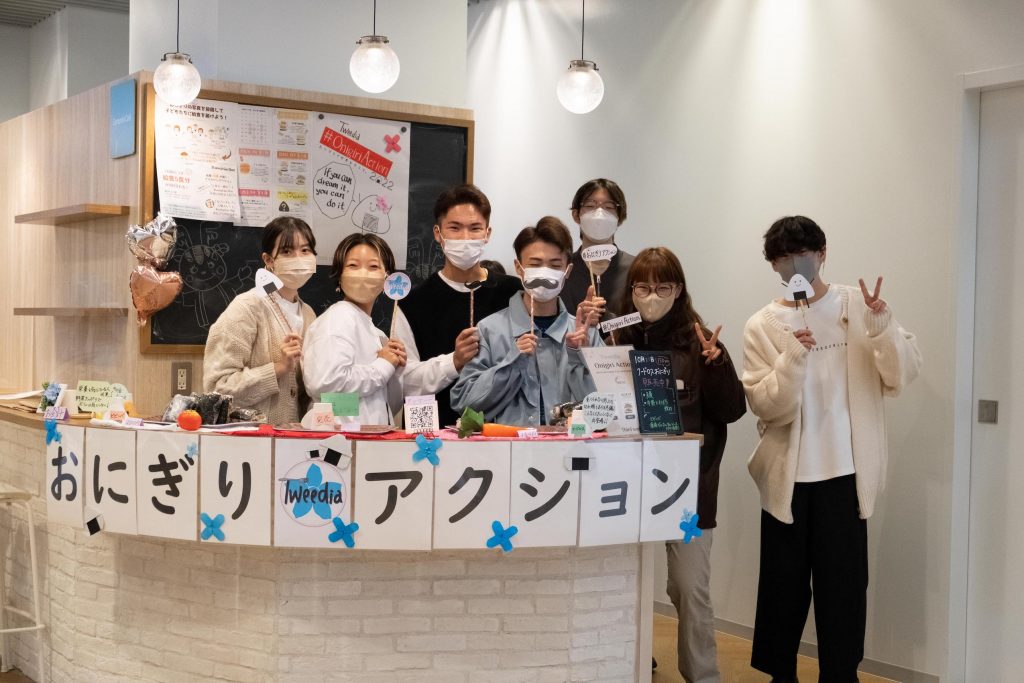このページを 日本語 で読む
As a second-year International Exchange and Cooperation student at Reitaku University in Kashiwa, Chiba Prefecture, I think often about becoming an international volunteer in the future. I want to do good work that will help the poor.
But what can I do now, while I’m still in school?
I decided to take a leadership role in my volunteer club at Reitaku. Through my club, called 'Tweedia,' I do my part to help reduce food loss in my local community.
The name 'Tweedia' comes from a blue flower. In the language of flowers, tweedia represents a 'spirit of mutual trust' and 'happy love'. We believe in sharing these sentiments with the poor.
This year, Tweedia is participating in the 'Onigiri Action' program run by a non-profit organization called Table For Two. We named our initiative Onigiri Action 2022@Reitaku.
I got the idea to do volunteer work involving food from a class I am taking on social business. As part of my classwork, I searched for an activity to help developing countries. When I watched a video about Table For Two, I strongly wanted to help them achieve their vision.
Not able to visit a developing country during the COVID-19 pandemic, I wanted to do what I could right here in Kashiwa.
'Onigiri Action' Makes Volunteering Taste Good!
There are two main parts to our initiative.
First, Tweedia sells rice balls (onigiri) which make use of leftover food made by a restaurant on campus called Manryo. We give twenty yen per onigiri to Manryo, and in exchange Manryo gives us onigiri using food which would otherwise be discarded.
This helps reduce food waste. And it’s also tasty! I was very glad to hear customers who bought our onigiri say, “This tastes good” and “I’m happy to be able to help people by eating delicious onigiri.”
Our volunteer work helps a local business, helps keep perfectly good food from being thrown away, and helps Reitaku students by providing a healthy and delicious option for lunch. I am very gratified by my work in starting Tweedia and planning the Onigiri Action initiative.
Volunteering Can Be Child’s Play, Too
The second part of Tweedia’s Onigiri Action project is collaboration with local kindergarten students and their parents. We make onigiri and teach the children about food issues through a traditional Japanese picture story show called kamishibai.
Today’s kindergarten students have missed out on a variety of experiences because of the many virus-related restrictions these past few years.
Both children and their parents looked so happy learning together about onigiri. This was also very gratifying to me.
Doing Our Part to Advance the Sustainable Development Goals
Table for Two’s work not only helps address poverty issues through more thoughtful use of food, but also contributes to improving the environment by reducing food waste.
By helping with this work through the Onigiri Action project, Tweedia plays a part in advancing the Sustainable Development Goals (SDGs). We donate our profits to the World Food Programme (WFP).
Our faculty advisor, Professor Ritsu Fuyutsuki of Reitaku University and The Moralogy Foundation, helps us coordinate our work toward SDGs.
Dr Fuyutsuki commented on the potential of our club's activities:
Linking various knowledge learned at university with real learning in actual social activities will lead to the first step toward realizing a sustainable society. The Onigiri Action event by Tweedia aims to address poverty issues (SDG 1) and food loss (SDG 12). We are confident that this event will spread not only within the university, but also to the local community, thereby contributing to raising public awareness of the need for a sustainable society.
Looking Ahead
Our Onigiri Action 2022@Reitaku program was a success. I appreciate the many people who supported us.
We hope to gradually expand the scale of the program so that we can reach not just the Reitaku University, Moralogy Foundation, and the kindergarten where we volunteer, but also the wider community in the vicinity.
We want to keep doing our part in any way we can.
Kohei Arai is a student at Reitaku University and a guest contributor to Japan 2 Earth.
このページを 日本語 で読む
